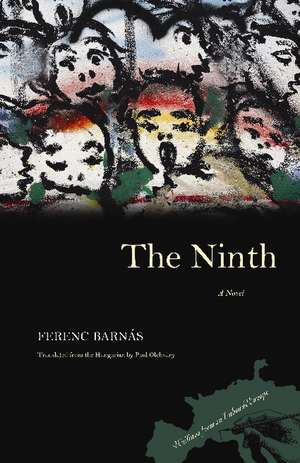The Ninth: A Novel: Writings From An Unbound Europe
Autor Ferenc Barnas Traducere de Paul Olchvaryen Limba Engleză Paperback – 9 apr 2009
Set in a sleepy village north of Budapest in 1968, this touching, unsettling novel paints a richly wrought portrait of mid-twentieth-century Hungary. The narrator is the ninth child of a family distinguished by its size, poverty, faith, and abundance of physical and psychological disabilities. His confusion is exacerbated by the strict, secretive Catholic household his parents keep in the face of a Communist system. These dual oppressions propel him toward an inevitable realization of his guilt and desire that speaks to his struggle with a fateful, seamless beauty.
Preț: 91.73 lei
Nou
Puncte Express: 138
Preț estimativ în valută:
17.56€ • 18.28$ • 14.84£
17.56€ • 18.28$ • 14.84£
Carte indisponibilă temporar
Doresc să fiu notificat când acest titlu va fi disponibil:
Se trimite...
Preluare comenzi: 021 569.72.76
Specificații
ISBN-13: 9780810126022
ISBN-10: 0810126028
Pagini: 176
Dimensiuni: 140 x 216 x 33 mm
Greutate: 0.25 kg
Ediția:1
Editura: Northwestern University Press
Colecția Northwestern University Press
Seria Writings From An Unbound Europe
ISBN-10: 0810126028
Pagini: 176
Dimensiuni: 140 x 216 x 33 mm
Greutate: 0.25 kg
Ediția:1
Editura: Northwestern University Press
Colecția Northwestern University Press
Seria Writings From An Unbound Europe
Notă biografică
FERENC BARNÁS is an acclaimed Hungarian novelist whose books include Az élosködo (The Parasite) and Bagatell (Bagatelle). He is the recipient of two of Hungary’s highest literary honors: the Sándor Márai Prize (2001) and the Tibor Déry Prize (2006).
Recenzii
"The Ninth is a masterpiece . . . It is an elegant book and a ruthless one." —Peter Esterhazy
"This coming-of-age novel leaves the reader guessing about the protagonist’s future, while marveling at youth’s resilience. The Ninth is Barnas’ ironic “Ode to Joy.”" —World Literature in Review
Descriere
Set in a sleepy village north of Budapest in 1968, this touching, unsettling novel paints a richly wrought portrait of mid-twentieth-century Hungary. The narrator is the ninth child of a family distinguished by its size, poverty, faith, and abundance of physical and psychological disabilities.















